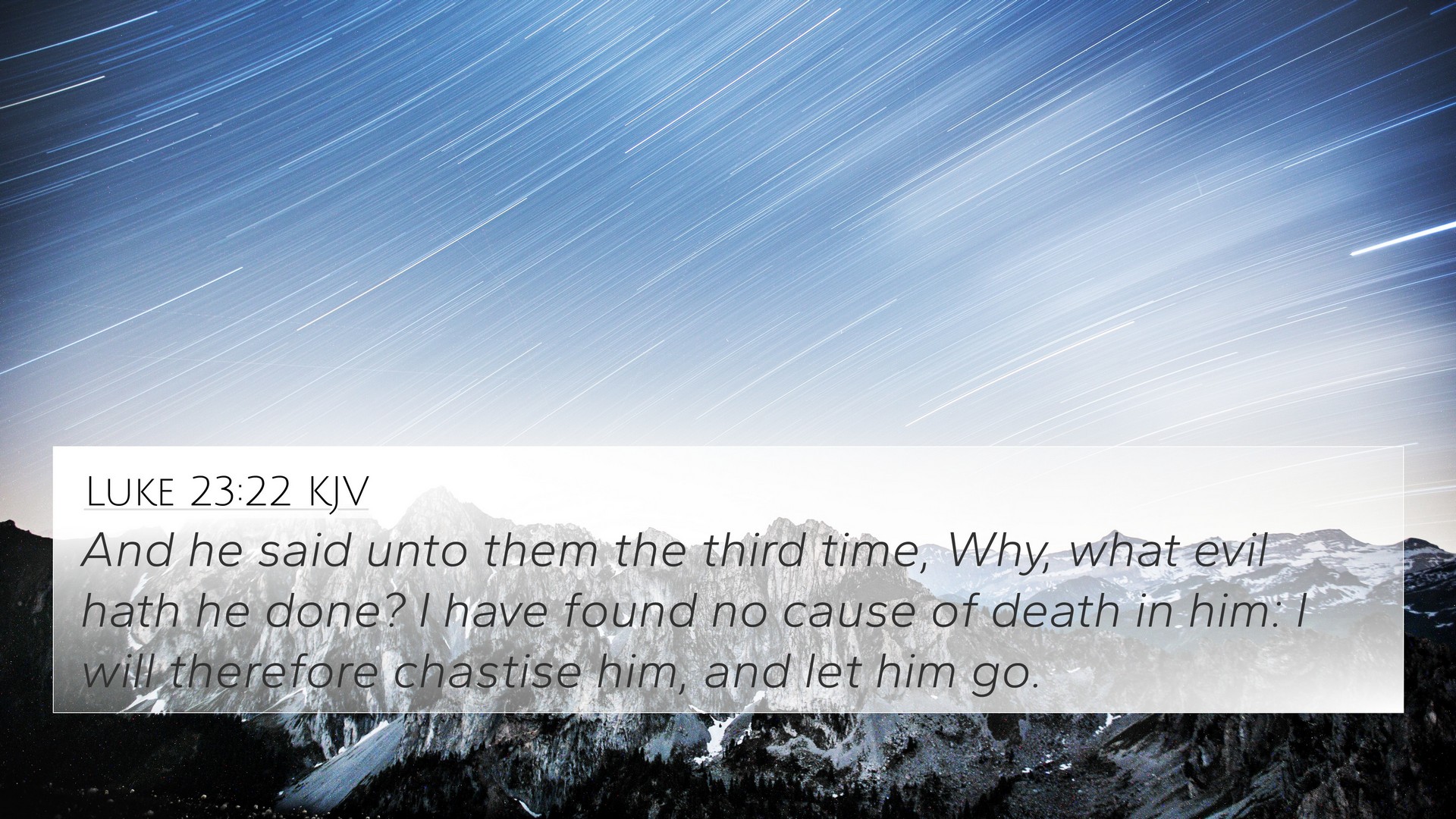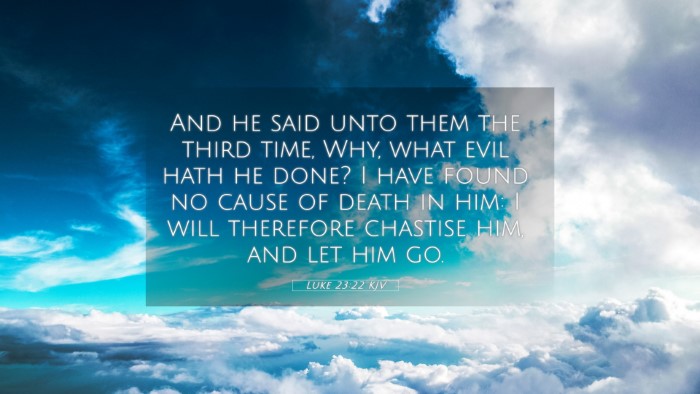Understanding Luke 23:22
Luke 23:22 states: "And he said unto them the third time, Why? What evil hath he done? I have found no cause of death in him: I will therefore chastise him, and let him go." This verse occurs during the trial of Jesus before Pilate, where the Roman governor grapples with the decision of what to do with Jesus, who is accused of various crimes.
Verse Context
This verse is situated in a critical moment within the narrative of the Passion of Christ, serving as a poignant juncture where Pilate seeks to assert justice amidst the clamorous demands for Jesus' crucifixion.
Commentary Insights
Various public domain commentaries provide deep insights into this verse:
- Matthew Henry’s Commentary:
Henry emphasizes Pilate's repeated questioning and the futility of the accusations against Jesus, highlighting the governor's struggle to uphold justice in the face of popular demand. Henry notes Pilate's reluctance to condemn Jesus, asserting he found no fault in Him.
- Albert Barnes’ Notes:
Barnes elaborates on the significance of Pilate's questions, indicating they reveal the ignorance of the accusers regarding the true nature of Jesus' ministry. He underscores Pilate’s intent to avoid the bloodshed of an innocent man while still attempting to appease the crowd.
- Adam Clarke’s Commentary:
Clarke discusses Pilate's character and moral conflict. He argues that Pilate's internal struggle reflects the universal conflict of acknowledging truth while succumbing to societal pressures. Clarke emphasizes the irony of chastising Jesus yet finding no grounds for condemnation.
Thematic Connections
This verse serves not only as a narrative device but also as a rich thematic element that speaks to various concepts in the Bible, including justice, innocence, and the clash between authority and conviction. Its exploration can lead to cross-references that deepen the understanding of Christ's trial and the ultimate expression of innocence.
Bible Cross-References
- Matthew 27:24: Pilate's symbolic act of washing his hands, indicating his attempt to absolve himself from responsibility for Jesus' death.
- John 18:38: "What is truth?" Pilate questions the nature of truth, paralleling the narrative of accountability.
- Luke 23:4: Where Pilate initially declares Jesus innocent, reinforcing the theme of wrongful accusation.
- Isaiah 53:7: Prophetic reference to the suffering servant who does not defend Himself, mirroring Jesus' silent endurance.
- Acts 3:14: Peter's address, recalling how they chose a murderer over the Holy One, offering further context to the public's rejection of Jesus.
- 1 Peter 2:22: This verse declares the sinlessness of Jesus, linking back to Pilate's affirmation of His innocence.
- Romans 5:6-8: Discusses Christ's selfless sacrifice for the ungodly, echoing the themes of innocence and injustice present in Luke 23:22.
- Revelation 5:6: Depicts Jesus as the Lamb who was slain, tying into His ultimate sacrifice despite being found innocent by earthly authorities.
- Proverbs 17:15: "He who justifies the wicked and he who condemns the just are both alike an abomination to the Lord," illustrating the moral gravity of Pilate's actions.
- John 19:6: The chief priests vehemently crying out for Jesus' crucifixion suggests the all-too-human desire for power despite the truth.
Practical Applications
The lessons derived from Luke 23:22 offer rich avenues for personal reflection and understanding:
- Integrity in Leadership: Reflect on the role of moral courage in leadership, as exemplified by Pilate’s reluctance to act against his conscience.
- Justice versus Popular Opinion: Consider how often societal pressure challenges personal convictions and the importance of standing for truth.
- Recognition of Innocence: Engage with the theme of innocence in today's context, recognizing the impact of wrongful accusations and the necessity for justice.
- The Suffering Servant: Meditate on Jesus’ role in His suffering and its significance in the broader narrative of salvation.
Conclusion
In conclusion, Luke 23:22 encapsulates profound moral and theological implications, presenting a moment where political authority fails to acknowledge divine truth. Through scriptural cross-referencing, one can explore deeper themes of innocence, justice, and sacrifice, contributing to a richer understanding of the Gospel narrative.
Further Study
To fully appreciate the connections and implications of this verse, one may utilize tools for Bible cross-referencing, engaging in cross-reference Bible study methods. This can involve using a Bible concordance or a cross-reference guide to identify related verses, facilitating a detailed understanding of the thematic Bible verse connections.







